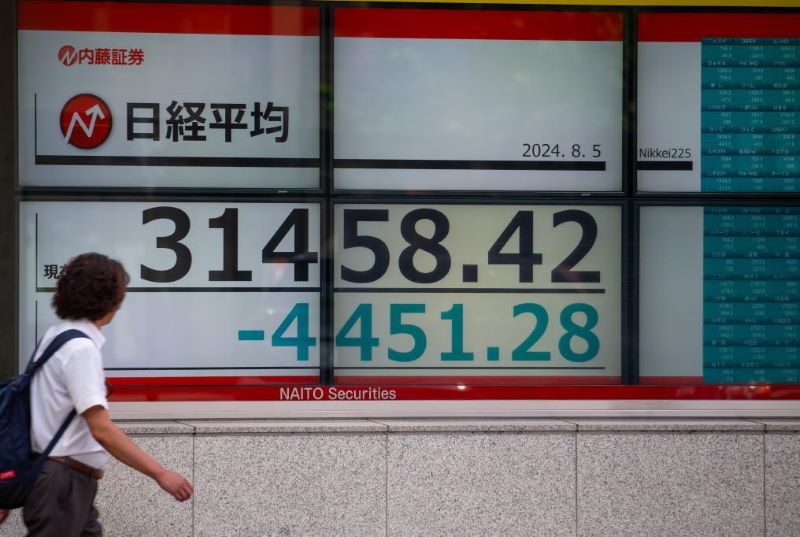Due to the recent weakness in U.S. economic data and investors’ fears of a U.S. economic recession, panic selling hit the Tokyo stock market on the 5th, with the Nikkei index dropping a record number of points. Analysts noted that “foreign institutional investors, hedge funds, and Japanese individual investors are all rushing to exit the market.”
Following a sharp decline on August 2, the Tokyo stock market saw another plunge in the early trading session on the 5th. By the close, the Nikkei index had fallen by 12.40%, and the TOPIX index had dropped by 12.23%, erasing all gains made since the beginning of 2024.
On that day, the Nikkei index dropped by 4,451.28 points, closing at 31,458.42 points, while the TOPIX index fell by 310.45 points, closing at 2,227.15 points. This marked the first time the Nikkei index fell by over 4,000 points in a single trading day. The previous record was set on October 20, 1987, with a drop of 3,836 points. All 33 industry sectors on the Tokyo Stock Exchange experienced declines, with most sectors dropping by over 10%.
Since August 1, the Tokyo stock market has experienced significant declines for three consecutive days, with the Nikkei index cumulatively falling by over 7,600 points. On July 19, the Nikkei index was still above the 40,000-point mark.

Due to the panic selling on that day, the Osaka Exchange temporarily halted trading of Nikkei and TOPIX futures after triggering circuit breakers as their prices fell beyond the set limits.
Why did the Tokyo stock market experience panic selling? According to local media and analysts, the primary trigger for the continuous decline in the Tokyo stock market was concerns stemming from the U.S., particularly the possibility of an economic recession, which caused significant volatility in global markets.
The Federal Reserve concluded its two-day monetary policy meeting on July 31, hinting at a potential rate cut in September. With the negative effects of high interest rates on the U.S. economy becoming increasingly apparent, some economists are worried that the Fed’s delayed rate cut could pose risks to the U.S. economy.
Data showed that the U.S. Manufacturing Index for July was 46.8, significantly lower than June’s 48.5 and further below the 50-mark, indicating continued contraction in the manufacturing sector. New orders for durable goods fell by 3.3% month-on-month in June, following a 0.5% decline in May. Additionally, the number of non-farm jobs added in July was significantly below market expectations, while the unemployment rate was higher than expected.
A series of disappointing economic data intensified market fears of a potential U.S. recession, leading to consecutive declines in the Dow Jones Industrial Average, S&P 500, and NASDAQ Composite Index on August 1 and 2.

Furthermore, the sharp appreciation of the yen dealt a double blow to the Tokyo stock market. In early July, when investors were still optimistic about the U.S. economic outlook, the exchange rate of the yen against the dollar fell to 161 yen per dollar, the lowest level since December 1986. On the 5th, the yen surged to 141 yen per dollar, appreciating by over 4% in one day. Over the past month, the yen has appreciated by more than 11% against the dollar.
Experts attribute the rapid appreciation of the yen to two main factors. First, expectations of a U.S. economic recession have led to a broad weakening of the dollar against major global currencies. Second, the latest unexpected interest rate hike by the Bank of Japan reversed the prevailing trend of “selling yen and buying Japanese stocks,” particularly as investors anticipate further rate hikes by the Bank of Japan, adding to the upward pressure on the yen.
Analysts believe that the more severe decline in the Japanese stock market compared to the U.S. market may be due to “excessive panic” among Japanese investors and could indicate continued significant volatility in the U.S. market.













Leave a comment